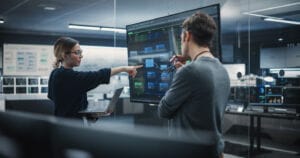The world of music has always been a space of creativity, emotion, and human expression. Yet, as technology advances, the traditional boundaries of music creation are expanding in ways that were once unimaginable. Enter AI music generators—a groundbreaking innovation poised to redefine the landscape of music. By merging the realms of artificial intelligence and musical composition, these tools are not only transforming how music is made but also challenging our perceptions of what music can be. This article delves into the intricacies of AI music generators, exploring their functions, benefits, challenges, and the profound impact they are likely to have on the future of the music industry.
What Is AI Music Generator?
AI music generator is a software tool that uses algorithms and machine learning to compose music autonomously. Unlike traditional methods of music creation, where human intuition and creativity play central roles, AI music generators rely on vast datasets and computational power to produce melodies, harmonies, and rhythms. These systems analyze thousands of songs to learn patterns, styles, and structures, allowing them to create original compositions that mimic human-made music. While the concept might seem futuristic, AI music generators have already begun to influence various aspects of music production, from composing background scores to creating entire symphonies. As they continue to evolve, these tools are not just assisting musicians but also standing as independent creators in their own right.
How Do AI Music Generators Work?
The mechanics behind AI music generators are both fascinating and complex, involving a blend of data science, neural networks, and deep learning.
Machine Learning and Music Datasets
At the heart of an AI music generator lies machine learning, a branch of artificial intelligence that enables systems to learn from data. These tools are fed with extensive music datasets, comprising various genres, artists, and compositions. The AI studies these datasets to identify patterns in melody, harmony, rhythm, and even emotional undertones. By recognizing these patterns, the AI can generate new music that adheres to the learned styles while still introducing unique elements.
Neural Networks and Music Composition
Neural networks play a critical role in AI music generation. These are computational models inspired by the human brain’s structure, consisting of interconnected nodes or “neurons.” In the context of music generation, neural networks are used to process the vast amounts of data input and to produce outputs that resemble the training data. This allows AI to create music that feels organic and human-like, albeit produced by a machine.
The Role of Algorithms
Algorithms are the instructions that guide the AI in its music creation process. They determine how the AI interprets the data it has learned and how it applies this knowledge to generate new compositions. These algorithms can be adjusted to emphasize certain aspects of music, such as melody or harmony, or to explore more experimental forms of music creation.
What Are the Benefits of Using AI in Music Creation?
The integration of AI in music creation offers a plethora of benefits, revolutionizing how music is composed, produced, and consumed.
- Efficiency and Speed: AI can compose music at an unprecedented speed, reducing the time and effort required to create new pieces. This is particularly beneficial in industries where quick turnaround times are essential, such as advertising and film scoring.
- Cost-Effectiveness: By automating the music creation process, AI can significantly reduce production costs. This allows independent artists and smaller studios to access high-quality compositions without the need for expensive human talent.
- Creative Exploration: AI music generators can explore musical possibilities that may not be intuitive to human composers. This opens up new avenues for creativity, leading to innovative and experimental music that pushes the boundaries of traditional genres.
- Personalization: AI can tailor music to individual preferences, creating personalized soundtracks that resonate with the listener’s emotions, moods, or activities. This has significant implications for applications like fitness apps, gaming, and personal entertainment.
Can AI Replace Human Musicians?
The rise of AI in music raises a thought-provoking question: can AI truly replace human musicians? While AI music generators, such as those found on platforms like AI Song Generator, are incredibly advanced, they lack the emotional depth and personal experiences that humans bring to music. Music, at its core, is an expression of the human soul—an art form that conveys feelings, stories, and cultural nuances. Human musicians draw from their personal lives, emotions, and cultural backgrounds to create music that resonates on a deeply emotional level.
AI, on the other hand, relies on data and algorithms, producing music that, while technically sound, may lack the emotional connection that human-made music provides. Furthermore, the collaborative and improvisational aspects of music-making, which are integral to genres like jazz and live performances, remain areas where human musicians excel. While AI can replicate and even innovate within established musical frameworks, it cannot fully replace the unique, intangible qualities that human musicians bring to the art of music.
What Are the Challenges Faced by AI Music Generators?
Despite their many advantages, AI music generators face several challenges that limit their current capabilities and future potential.
- Lack of Emotional Depth: AI-generated music often lacks the emotional nuance that human musicians naturally infuse into their compositions. This can result in music that feels technically proficient but emotionally hollow.
- Ethical Concerns: The use of AI in music creation raises ethical questions, particularly regarding copyright and ownership. Who owns the rights to music created by AI? And how do we ensure that AI-generated compositions do not infringe on existing works?
- Creative Limitations: While AI can mimic and innovate within existing musical styles, it is inherently limited by the data it has been trained on. This means that truly groundbreaking, genre-defining music is still largely the domain of human creativity.
- Public Acceptance: There is a degree of skepticism and resistance among both musicians and audiences toward AI-generated music. Many people question whether music created by a machine can ever truly be considered “art.”
How Is AI Shaping the Future of the Music Industry?
AI is poised to have a profound impact on the music industry, influencing everything from how music is created to how it is distributed and consumed. In the near future, we can expect AI to become a standard tool in music production, aiding musicians in composing, arranging, and even performing music. AI’s ability to analyze and predict musical trends could also revolutionize the way music is marketed, helping artists and labels better understand and cater to audience preferences. Furthermore, platforms offering alternatives, such as Suno AI alternative, are expanding the range of tools available to musicians, ensuring that AI-generated music continues to evolve and innovate, leading to the emergence of entirely new genres and forms of music.
Conclusion
The advent of AI music generators marks a significant milestone in the evolution of music creation. While these tools offer remarkable efficiency, creativity, and accessibility, they also raise important questions about the role of human musicians in an increasingly automated world. As AI continues to develop, it is likely to become an indispensable part of the music industry, complementing human creativity rather than replacing it. The future of music, it seems, will be one where technology and artistry harmoniously coexist, creating new and exciting possibilities for musicians and listeners alike.



